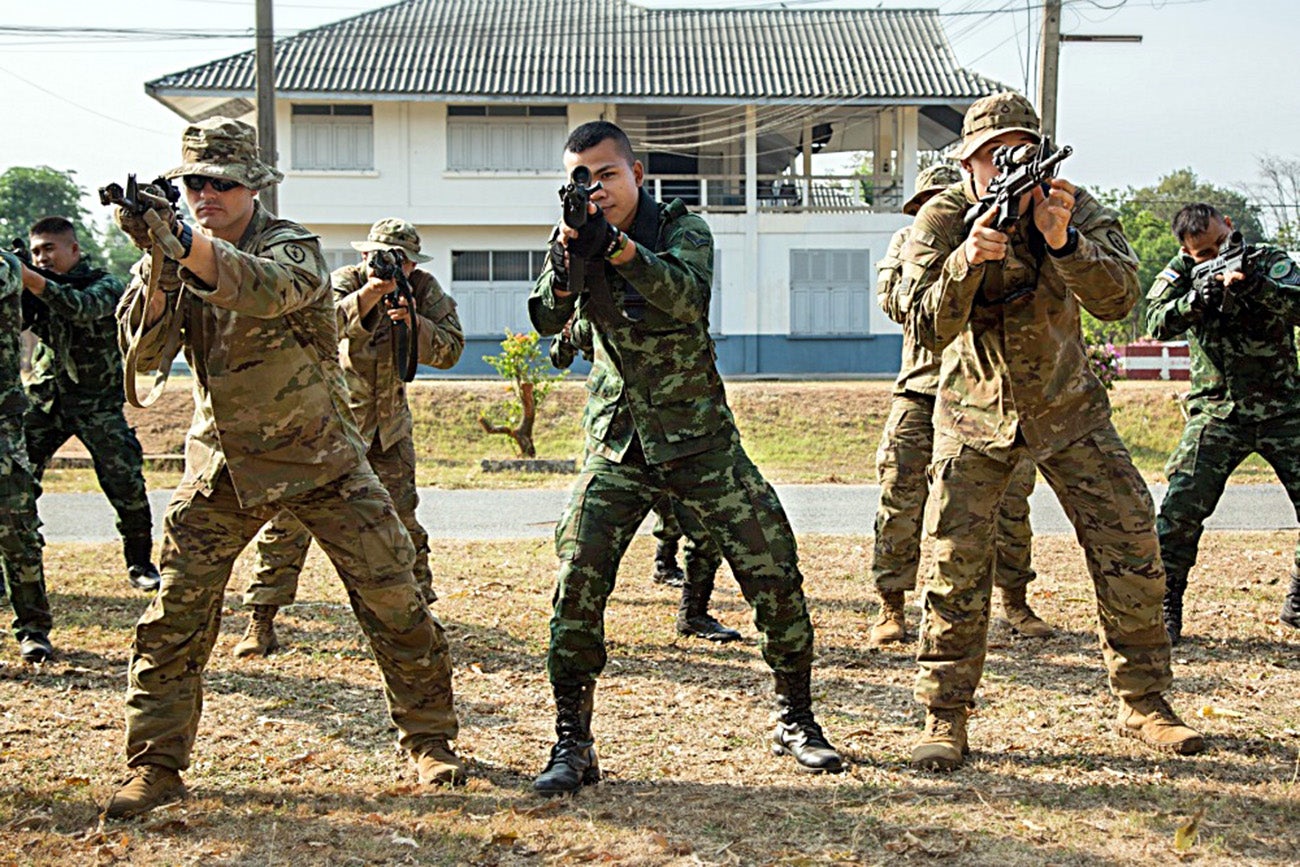Indo-Pacific cooperation crucial in solving complex problems
Indo-Pacific cooperation crucial in solving complex problems
The unpredictability of life in the Indo-Pacific region has thrown out conventional wisdom, said the commander of U.S. Army Pacific.
“The challenge is, as the world gets more complex, bi-lateral [approaches] aren’t going to work,” said Gen. Robert Brown during the opening of the 2018 LANPAC Symposium and Exposition in Honolulu.
Adding,“Whether it’s humanitarian assistance or disaster response, whether it’s violent extremists ... or whether it’s all-out conflict, multi-lateral is definitely the way to go.”
Cooperation among multiple nations has taken on increased importance as weather and other unforeseeable threats continue to endanger those who live in vulnerable areas of the Indo-Pacific region.
To assist when needed, military units can no longer rely on preparation alone, Brown said, speaking before an audience with military members from more than 26 nations.
He instead pushed the importance of armies from multiple nations working together as part of a multi-lateral approach.
“You can’t anticipate these things that happen because of the speed of interaction ... you can’t predict it,” he said. “You are going to get hit by a black swan. Just take a look at events around the world over the last year.”
A “black swan” event is one that is a surprise, has major impact, and in its aftermath, observers tend to rationalize as having been predictable.
According to recent studies, one billion people will reside near high-risk areas in the Indo-Pacific region by 2020.
Natural disasters there, such as hurricanes, monsoons and floods, will pose great risk to those persons. This provides more reason for military services to encourage joint interactivity.
Brown credited a multi-national response to disasters in Japan and Nepal for successfully providing crucial assistance and saving lives. The 2015 earthquake in Nepal took the lives of 9,000 and injured another 22,000.
The Nepalese army created a joint coordination center where 34 nations assisted in the relief efforts. A multi-lateral effort of 18 military teams delivered 966 tons of supplies due in large part to an intermediate staging base in Thailand.
“Individuals were able to take advantage of that intermediate staging base and save lives,” Brown said.
During the 2011 earthquake and tsunami that caused a nuclear disaster at the Fukushima Daiichi Nuclear Power Plant in Japan, cooperation among neighboring nations allowed faster recovery response. Brown cited prior relationships as crucial during those operations.
“It didn’t just come out of nowhere,” he said. “It came from the effort working together before. You don’t start the relationship in a crisis.”
He also noted that threats of violence from Islamic extremists remain a possibility in the region. Last year a joint effort by Indonesia, the Philippines and Malaysia helped quell an extremist attacks in the Sulu Sea, sandwiched between northern Malaysia and the Philippines.
Brown said there is a noted shift from bi-lateral efforts to multi-lateral efforts that begins with training and establishing relationships.
U.S. Army Pacific took part in 13 mostly bi-lateral exercises a decade ago.
Today, the number of mostly multi-lateral, multi-national exercises numbers 43.
Increasingly, he said, more nations are taking part in multi-national exercises.
The Navy’s Rim of the Pacific Exercise, held in Honolulu, for instance, has grown into the largest maritime joint exercise in the world. In 2010, just 14 nations were involved. Today, the number of participants stands at 26.
Cobra Gold began as a bi-lateral exercise between the United States and Thailand in 1984. Then, there were only 300 participants.
Today, that exercise has grown to include participation by 35 nations and 9,000 military members.
A panel of senior leaders from the United States, Japan, South Korea and Australia also highlighted the value of multi-national cooperation during the Yama Sakura joint exercise, the most recent iteration of which concluded in December.
Senior leaders called the exercise a rousing success based on the multi-domain approach from the strategic to tactical levels as well as the cooperation of participating nations.
“The joint inter-agency, multi-national construct is critical,” said Australian army Maj. Gen. Roger Noble and U.S. Army Pacific deputy commanding general.
Adding, “Each country has different capabilities, but the use of the framework gave us a whole range of opportunities that previously we may have not considered.”
The fog of war has changed
In the past, Brown said, the lack of timely information often posed difficult problems for military operations.
Today, the internet has connected nations in ways like never before, and online access has provided an abundance of information that can make cybersecurity increasingly important.
“Things are connected,” Brown said. “It’s changed the very velocity of human interaction. There’s no doubt about it. It’s changed the fog of war. The fog of war used to be not enough interaction.”
Now, Brown said, it is that wealth of information that can make strategic decisions difficult.
Brown added the importance of professionalism among military members can be crucial to maintaining good relations with other nations.
Public perception can impact relationships, the general said. Footage of military members’ conduct on television and the internet have the potential to reach millions. “Trusted teams of professionals that thrive in ambiguity and chaos are absolutely critical,” Brown said.


